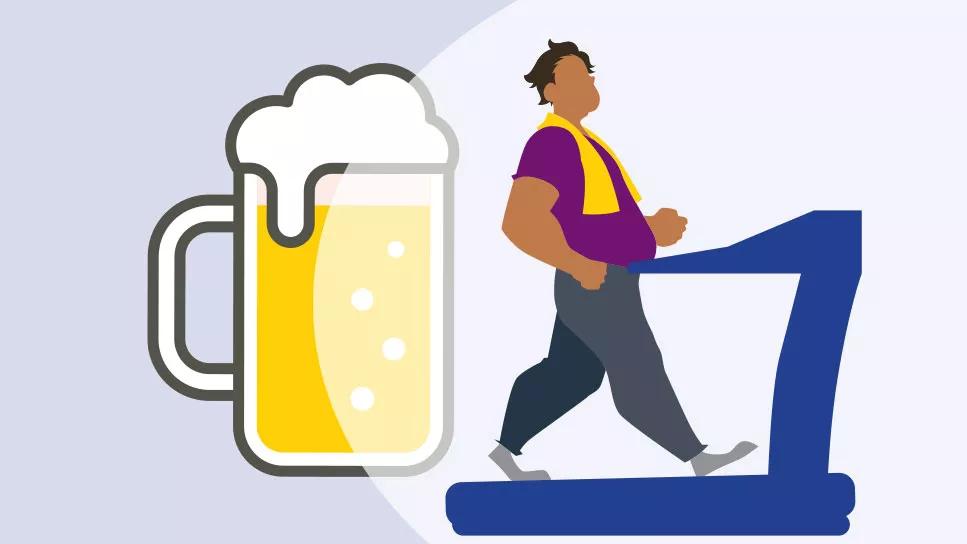Getting rid of excess abdominal fat will take more than just cutting back on cold ones

Image content: This image is available to view online.
View image online (https://assets.clevelandclinic.org/transform/33df2b05-5146-44f4-8990-901737e14d45/beer-Belly-person-Exercises-610878138-967x544-1_jpg)
male with beer belly on treadmill, with giant mug of beer next to
You love an occasional ice-cold beer or two … but is your penchant for brews to blame for the so-called “beer belly” you’ve started to develop?
Advertisement
Cleveland Clinic is a non-profit academic medical center. Advertising on our site helps support our mission. We do not endorse non-Cleveland Clinic products or services. Policy
Excess abdominal fat can pose a danger to your health, though the term “beer belly” is a misnomer, as it’s not a byproduct of booze alone. Even sober folks can develop the type of extra abdominal fat that’s sometimes associated with drinking beer — but alcohol certainly doesn’t help.
Family medicine physician Daniel Allan, MD, explains what causes a beer belly, the risks it brings and how to work on getting rid of it.
There’s no evidence to show that drinking beer contributes specifically to weight gain around the abdomen area, aka the beer belly. But there’s plenty of evidence that beer and other types of alcohol play a role in weight gain in general — and you don’t have to be a heavy or frequent drinker for beer to lend itself to extra pounds.
Let’s take a look at what alcohol does to your belly (as well as the rest of your body).
“Consuming too many calories — whether from alcohol, sugary foods or just a lot of extra food — can lead to extra belly fat,” Dr. Allan says. And because an average can of beer runs you more than 150 calories, it doesn’t take long for the calories (and the belly) to build.
Alcohol also stimulates your appetite, which can lead you to eat more than you might otherwise — and it can impair your judgment, leading you to make less healthy food choices. (Hello, late-night fast food after hitting the bars.)
Advertisement
Alcohol gets in the way of your body’s ability to burn fat. Your liver plays an important role in metabolizing proteins, carbohydrates and fats so your body can use them — but if given the choice, your liver would rather burn off alcohol than fat.
“Your liver will preferentially burn alcohol instead of fat when it is consumed,” Dr. Allan explains, “so beer can interfere with fat burn.”
Your genes play a role in so much of your health. In the case of beer bellies, Dr. Allan says that your sex recorded at birth may be the biggest genetic factor in where your body stores fat.
“In general, women tend to store fat in their arms, thighs and buttocks, as well as their bellies, while men tend to store more in their bellies alone,” he clarifies. (Of course, this isn’t true for everyone, and your experience may vary.)
He adds: “Women tend to start out with smaller bellies, but all of us become more likely to store fat in our midsections as we age and our hormone levels decrease.”
Having extra weight around your midsection — sometimes also known as a “spare tire” — is linked with an increased risk for a variety of health problems, including:
“A person with a very firm beer belly is at even higher risk for health problems because it’s typically caused by a high accumulation of visceral fat,” Dr. Allan warns. “This fat is located in the organs themselves and between the organs inside your abdomen.”
Visceral fat is tightly packed, and as it builds up, it pushes the abdominal wall outward, exaggerating the appearance of a beer belly. The abdominal wall itself is made of muscle and tough fibrous tissues, which makes it very firm. That leads to a belly that feels hard.
For women, a waist circumference of 35 inches indicates increased risk; for men, it’s 40 inches.
This isn’t what you want to hear, we know, but here it is: “There is no magic formula,” Dr. Allan says. “Losing weight requires consistent attention to a balanced diet and appropriate portions, combined with regular physical activity.”
But there are some specific steps you can take to get rid of belly fat:
Advertisement
Here’s some good news: “Visceral fat can be broken down quicker than other types of body fat,” Dr. Allan says. That means that when the weight does start to come off, you’ll notice it disappearing from your midsection first.
Your frame isn’t the only part of you that will benefit from cutting back on booze. Alcohol also affects your brain, heart and liver, and it can increase your risk of certain cancers.
As you put in the hard work to tackle your ”beer belly,” just know that the rest of your body will appreciate it, too!
Advertisement

Sign up for our Health Essentials emails for expert guidance on nutrition, fitness, sleep, skin care and more.
Learn more about our editorial process.
Advertisement
Your tolerance decreases with age, thanks to body changes, health conditions and medications you may take
‘Blackout rage gallons’ can lead to dangerous levels of alcohol consumption
An enzyme deficiency or rosacea are potential causes of alcohol flush
ACV may help lower blood sugar and calm acid reflux, but don’t believe all the hype
Yes, grabbing a few beers or a couple of glasses of wine or cocktails with friends can increase your heart rate — dangerously in some cases
Drinking alcohol is known to raise your risk of various types of cancer
Forget the myth and answer nature’s call when your bladder feels full
Alcohol provides empty calories, heightens cravings and may slow down your metabolism
Prioritize your health by managing stress, strengthening your social connections and getting quality sleep
Bolsters, blankets, pillows and blocks can offer extra support, stability and comfort
Allergies, postnasal drip, asthma or reflux could be to blame for a cough that won’t quit